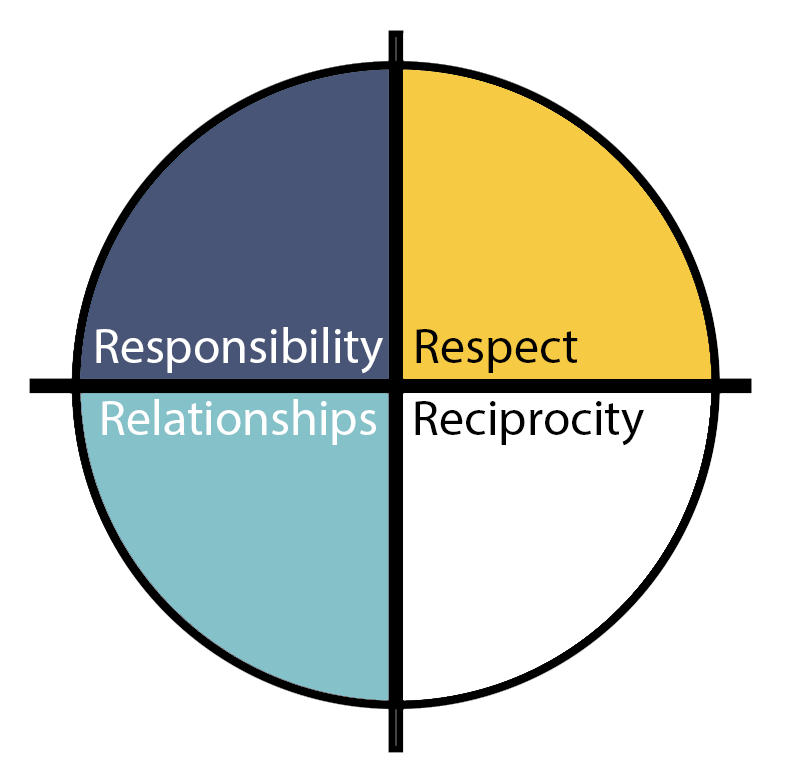
Whether you are starting a new collaboration, enhancing an existing relationship, or working to make professional connections more effective and respectful, we hope you find the following resources on the Four Rs relevant. If you have an example of using the Four Rs with your partnerships that you think would help your colleagues at other Nations or Villages, please let us know through the “Contact Us” option in the menu above.
“Start with the relationship.”
Summer King
Using the Four Rs to foster relationships throughout Superfund research projects
Summer King and Todd Barnell
Todd Barnell sat down with Summer King, Environmental Scientist from the Quapaw Nation, as part of our ongoing Superfund: Our Stories series. They chatted about how Summer and her team use the Four R’s in their work with researchers at two different universities and how the Four R’s have not only led to strong relationships but also mutually beneficial research products and data.
“The Four Rs…each of them requires a time investment.”
Jo Ellen Hinck
Using the 4 R's in Communication to Build, Strengthen, and Protect Relationships - a Panel Discussion with Tribal Professionals, Federal & State Staff, and Researchers
Rebecca Stevens, Ellen Isville, Summer King, Erika Wilson, Jo Ellen Hinck, and moderated by Todd Barnell
Respect. Relevance. Reciprocity. Responsibility. Practicing the Four Rs in communications with others outside of our organization can fundamentally change environmental outcomes. This panel discussion brought together members from Tribal, State, and Federal groups to discuss communication strategies that consider how the Four Rs improved outcomes for their organizations. We will also discuss overcoming communication challenges of governments’ roles and missions that can lead to strained relationships as well as describe successes in not only building and strengthening but also protecting relationships.
“Research is the pursuit of knowledge, and it is a sacred understanding.”
Rebecca Stevens
Navigating the Tribal Research Process - a Success Story with Coeur d'Alene Tribe and EPA Region 10
Rebecca Stevens and Jennifer Crawford
For researchers conducting research on the Coeur d’Alene Reservation, it is essential to understand the beliefs and vision of the Coeur d’Alene Tribal Community. Since time immemorial, the Tribe has been guided by its core values, articulated today in the Tribe’s Five Pillars. In this presentation, we hear about how early and often engagement with EPA has proven success during the permitting process. This is not considered Consultation, but we utilized the same communication style as if it was through direct, early and meaningful discussion between the Federal government (EPA) and the Tribe.
Recently, the Coeur d’Alene Tribe requires all researchers interested in working on their lands and with their staff to complete a Coeur d’Alene Research Permit Application. Combining a fair and consistent process with their principles of using the Four R’s in their work, helps both the Tribe and their research collaborators.
“By reciprocal restoration, we think of as a kind of peacemaking between land and people.”
Robin Wall Kimmerer
Dr. Robin Wall Kimmerer
Director of the Center for Native Peoples and the Environment at the SUNY College of Environmental Science and Forestry
In this beautiful presentation, Dr. Robin Wall Kimmerer begins with the question, ‘What does the earth ask of us?’ Part of the answer, she says, includes respect and gratitude. “Out of gratitude also comes the recognition of our need for reciprocity, a kind of justice in response to gratitude. Gratitude opens the door to reciprocity.” Drawing from both Tribal Ecological Knowledge and Scientific Ecological Knowledge, she builds a case for reciprocal restoration.
“Restoration, which is informed by restoring relationship to place, as well as restoring structure and function. And so this kind of healing of, of land, of Brownfields, of mine waste, of degraded habitats involves the gifts and responsibilities of human people to that place. So much so that we think that it really inspires reciprocal restoration. And by reciprocal restoration – a step beyond even biocultural restoration – what we mean here is that in healing the land, we’re healing ourselves.”
“It is the Coeur d’Alene Tribe’s expectation that research conducted within our homeland is done so with respect for all members of our community, including people, plants, animals, water and land; that it is done with reciprocity, understanding its benefits to both the researcher and our community; that the researcher does so through relationship in our community that embraces and upholds the five pillars; and that the researcher carries the responsibility of ensuring that his or her research is conducted in an ethical way that benefits the Coeur d’Alene people.”
Read More
Expanded Conceptual Risk Framework for Uranium Mining in Grand Canyon Watershed – Inclusion of the Havasupai Tribe Perspective
By Carletta Tilousi and Jo Ellen Hinck
The USGS released this expanded conceptual framework in Feb, 2024. “The expansion of the framework relied on connecting to the foundations of the Havasupai ceremonial wheel – food, environment, belief system, and ceremony.” The paper is a powerful example of how recomendations that are linked directly to human health and well-being can change dramatically when groups embrace the Four Rs going into the conversation. This paper sparked the idea for the panel discussion above.
The Six Rs of Indigenous Research
By Ranalda L. Tsosie, Anne D. Grant, Jennifer Harrington, Ke Wu, Aaron Thomas, Stephan Chase, D’Shane Barnett, Salena Beaumont Hill, Annjeanette Belcourt, Blakely Brown, and Ruth Plenty Sweetgrass-She Kills
This article published in the Tribal College Journal of American Indian Higher Education proposes, “a conceptual framework based on respect, relationship, representation, relevance, responsibility, and reciprocity (the Six Rs), to be applied in studies using Indigenous research methodologies (IRMs).” The authors build upon the work of Indigenous scholars and provide definitions and examples of each of the six Rs. The Six Rs provide a representative research framework and can be a powerful guideline across settings.
